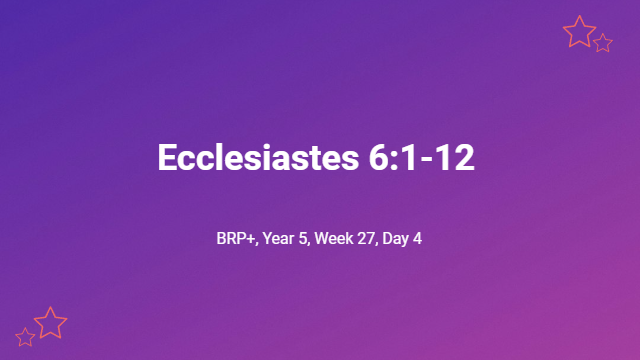Ecclesiastes 6:1-12
Q.1. What examples did Solomon give to underscore the pointlessness of life? Why did he suggest that it is better never to have been born? – (Ecc.6:1-6)
Solomon highlighted the futility of life, using two extremes: (i) A person who is successful in all his ways, but is unable to enjoy the fruits of his labours. A foreigner benefits from all his efforts (Ecc.6:1-2). (ii) A man who fathers a huge family but is unable to enjoy the blessings. He dies in obscurity without even a decent burial or (Ecc.6:3-4). Solomon concluded that one who dies in the womb is spared this pointlessness and eventual obscurity, so is better off. Few had as much as Solomon, and he had much to lose. He realized in the end that he would soon lose his influence (Ecc.2:9).
Q.2. What did Solomon observe about employment? Do the wise have an advantage over the fool? What can make the pursuits of life pointless? – (Ecc.6:7-9)
Men labour, so that they can enjoy the fruits of their labour. Without a higher reason for labour, it will not satisfy. Solomon found that there was little advantage for the wise man over the fool, since our work only serves to sustain life. In the end, what we long for will soon lose its shine. He ruefully concluded that the whole exercise is pointless. We must remember that these are observations about life, without considering God.
Q.3. How is our lot in life largely predetermined? Why is there a limit to words? What makes a healthy dependence on God crucial? – (Ecc.6:10-12)
Solomon considered that life is largely predetermined and endlessly repetitive. Though we have limited control over our destiny, much of it is beyond our control. Solomon also concluded that words are cheap and endless. Without follow-through and action, words too are futile. Because life is complex and has so many external factors, it is nearly impossible to choose the best way ahead. All these observations remind us about the need to factor God into the equation of our lives.

